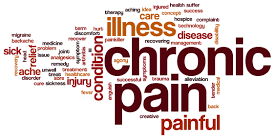Chronic pain is defined as, “ongoing or recurrent pain, lasting beyond the usual course of acute illness or injury or more than 3 to 6 months, and which adversely affects the individual’s well-being.” Chronic pain can have an impact on nearly every area of your life—physically, psychologically, personally and professionally.
There are everyday lifestyle changes that can help a person alleviate some of this pain, such as eating a healthy diet, exercising, participating in life and quitting smoking. However, there are times when these healthy lifestyle changes aren’t enough for the individual that is experiencing chronic pain. When additional medical attention is needed, this is where a pain management program can help.
Chronic pain is in no way uncommon, impacting 100 million people. More individuals suffer from chronic pain than diabetes, heart disease, and cancer combined.
The leading cause of disability and a major contribution to health care costs, pain is cited as the most common reason Americans access the health care system. When asked about four common types of pain, respondents of a National Institute of Health Statistics survey indicated that low back pain was the most common (27%), followed by severe headache or migraine pain (15%), neck pain (15%) and facial ache or pain (4%).
Back pain is the leading cause of disability in Americans under 45 years old. More than 26 million Americans between the ages of 20-64 experience frequent back pain. Chronic pain also affects the individual’s quality of life. More than 70% of those that suffer report feelings of depression, trouble concentrating, less energy and inability to sleep well.
-Thomas Kindl, MD













